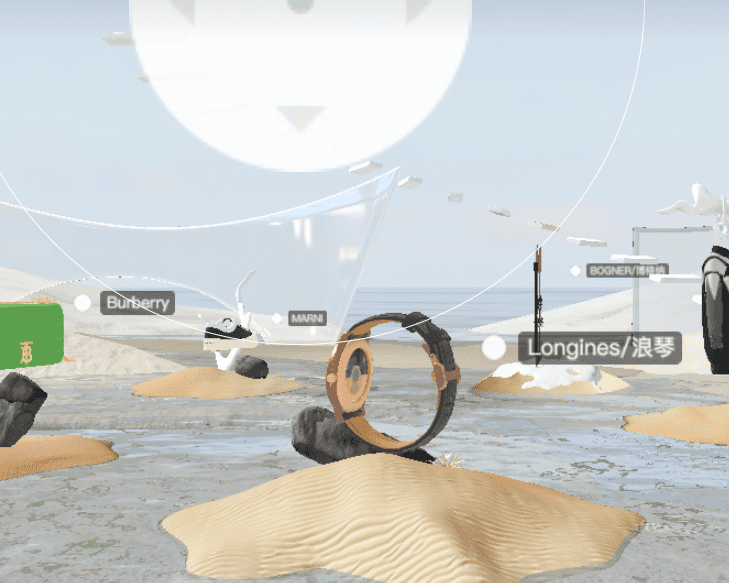ALIBABA ROLLS OUT DEEPER IMMERSIVE LUXURY SHOPPING EXPERIENCE IN THE METAVERSE

Alibaba Group is multiplying the ways that luxury brands can connect with China’s affluent shoppers in the metaverse by releasing a series of digital upgrades and events this month as part of the fifth-anniversary celebration of its Tmall Luxury Pavilion.
Tmall Luxury Pavilion is the largest online destination in China to host over 200 luxury brands from the five major luxury groups. From 2019 to 2021, Luxury Pavilion has seen its customer base grow by over 150% with sales increasing nearly 300%.
Driving the growth of Luxury Pavilion are innovative digital experiences that allow Chinese consumers to browse, interact, and experience the brands.
“Before ‘metaverse’ became a buzzword, we had already transformed this buzzword into a commercial reality,” said Janet Wang, head of Alibaba’s luxury division.
Now, as part of its fifth-anniversary celebration, Luxury Pavilion is hosting an augmented reality (AR) fashion show on September 22nd in collaboration with Vogue China and various artists. Instead of super models, imagine “super mascots” from top luxury brands will strut their stuff down virtual runways. Viewers on Tmall Luxury Pavilion’s platform can interact with these super mascots in various ways, including taking selfies with them.
Luxury Pavilion is also introducing a new Meta Pass which confers priority digital access to products from brands such as Burberry and Max Mara. Part of this Meta Pass package will be digital warrants certified on the blockchain. Swift-footed consumers will be able to exchange these warrants for limited editions, including Bogner’s 90th Anniversary snowboard, a Max Mara’s Fall/Winter 2022 collection oversized sweater, Burberry’s signature Lola bag, and Marni’s fleece-lined Pablo sneakers.
“The digital world can provide consumers with the same, or even better, shopping experiences and luxury-brand identities than in the real world,” said Wang.
Offering a glimpse at the retail of the future, Tmall Luxury Pavilion introduced an extended reality (XR) experience to luxury executives at a special ceremony in Shanghai, China. The technology was developed by Luxury Pavilion in conjunction with Alibaba’s research division, DAMO Academy’s XR Lab.
- Tmall Luxury Pavilion has been at the forefront of innovating online digital experiences for luxury. In recent years, the platform has already deployed 3D shopping, augmented reality (AR), and virtual reality (VR) try-ons for products, digital avatars, and digital collectibles.
Over 20 luxury brands have released digital art collectibles via Tmall Luxury Pavilion and laid on virtual fashion shows, where consumers send in their avatars into the metaverse to dress up in luxury products on 3D avatar game Taobao Life. - This year, Cartier, Vacheron Constantin, Burberry and others used video consultants to livestream one-on-one with VIP customers. More than 20 brands have launched watch testing on Tmall Luxury Pavilion, and other digital services such as bracelet adjustment, bag maintenance, even down to shoe cleaning.
Pandemic Purchases
In a tough few years for retailers globally, online consumption by the Chinese luxury consumer has been relatively resilient. While the majority of luxury shopping still takes place in physical retail stores, online and omnichannel expansion has steadily increased – China’s luxury online penetration surged to 23% in 2020, up from 12% the previous year. Tmall Luxury Pavilion hosts more than two hundred luxury brands, up from 150 before the coronavirus outbreak. While many cities in China have sporadically gone into lockdown, over 1,000 shopping events and new product launches took place digitally on the platform this year and last year. Additionally, luxury houses have continued to launch on Tmall Luxury Pavilion this year, even during the economic downturn, including Bulgari, Moncler and Brunello Cucinelli.
“We saw how quickly brands embraced digital transformation and consumer increased their online consumption,” said Wang. She noted consumption trends during the pandemic, such as an uptick in gifting for loved ones, purchases of home furnishings and objects that retain their value such as watches and jewelry.
Tmall Luxury Pavilion believes in sharing insights as the fashion industry is in the midst of a significant digital transformation and the early stages of its experiment with the metaverse. Towards that goal, Luxury Pavilion will release a white paper in conjunction with consultancy Roland Berger this month to help luxury brands active in China track the results of such online experiences so that they can optimize digital strategies, boost conversion rates and improve search results. Digital storefronts on Tmall Luxury Pavilion maintain brands’ liveries and look- and-feel; but at the backend, the stores have used Alibaba proprietary models to leverage insights from across its ecosystem.
By 2025, China is set to be the world’s largest luxury market. Tmall Luxury Pavilion has the best technology infrastructure to continue creating the connections between brands and Chinese consumers.
To View the XR experience and an interview with Janet Wang, please visit Alizila.








